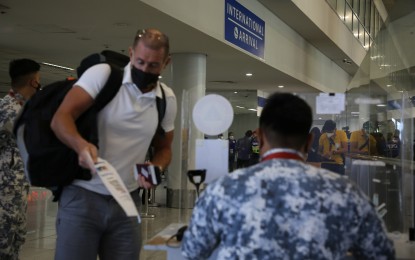
(File photo)
MANILA – Foreign travelers may visit the Philippines without an entry exemption document (EED) beginning April 1, Malacañang announced on Friday.
This, after the Inter-Agency Task Force for the Management of Emerging Infectious Diseases (IATF-EID) approved Thursday Resolution 165, which allows foreigners to enter the country sans the need of an EED as long as they comply with the applicable visa requirements and immigration entry and departure formalities.
“There is no more listing of which country the foreign national originates from, as long as they are able to present valid proof of vaccination and [follow the] guidelines,” acting Deputy Presidential Spokesperson and Communications Undersecretary Michel Kristian Ablan said in a virtual press conference.
Under IATF-EID Resolution 165, foreign travelers can enter the country, on conditions that they are fully-vaccinated and have acceptable proof of vaccination.
The acceptable proofs of vaccination that foreigners can present include the World Health Organization International Certificate of Vaccination and Prophylaxis, VaxCertPH, national or state digital certificate of foreign country accepting VaxCertPH, and other proof of vaccination permitted by the IATF-EID.
They must also present a negative reverse transcription-polymerase chain reaction (RT-PCR) test taken within 48 hours or a negative laboratory-based antigen test taken within 24 hours prior to their arrival to the country.
They must also have passports valid for a period of at least six months at the time of their arrival as well as valid tickets for their return journey to the port of origin or next port of destination not later than 30 days from date of arrival.
The rule for valid tickets does not apply to foreign spouses or children of Filipino citizens and former Filipino citizens with Balikbayan privileges.
Prior to their arrival in the Philippines, foreigners are also required to obtain travel insurance for the coronavirus disease 2019 (Covid-19) treatment costs from reputable insurance providers, with a minimum coverage of USD35,000 for the duration of their stay in the country.
Foreigners who fail to fully comply with the conditions and requisites set by the IATF-EID shall be denied admission into the country and shall be subject to the appropriate exclusion proceedings.
Once admitted into the country, foreign travelers no longer need to observe facility-based quarantine but are required to self-monitor for any sign or symptom of Covid-19 for seven days.
Foreigners with valid and subsisting EED issued prior to April 1 shall be allowed entry.
“With the new rules on the entry of foreign nationals, IATF Resolution No. 1310A dated 05 August 2021 allowing for the interim application for visa issuance shall no longer be applied beginning 01 April 2022,” the resolution read.
The Department of Foreign Affairs (DFA), the Department of Justice, the Department of Transportation’s One Stop Shop, the Bureau of Quarantine, and the Bureau of Immigration are directed to ensure the smooth implementation of the fresh directive.
Tourism, economic boost
In a statement, Tourism Secretary Bernadette Romulo-Puyat said this relaxed rule would revive the country's English as a Second Language (ESL) sector as it allows foreigners to travel to the country either visa-free or using their 9A visas and apply for their special study permit upon entering the country.
“Visitors who come for our education tourism—ESL in particular—stand to benefit from this development as this will grant foreign nationals who wish to study in the country an interim process to remotely secure their visas,” Romulo-Puyat said.
Local ESL schools, mainly in the country’s leading destinations for ESL such as Baguio and Cebu, have expressed their readiness to accept foreign students, Romulo-Puyat said.
Even amid the pandemic, the DOT has been promoting the country as an ESL hub and piloted initiatives such as the Master Teaching English to Speakers of Other Language (TESOL) to upskill and certify teachers from all over the country.
Data from the Bureau of Immigration (BI) showed that Special Study Permits (SSP) applications have continuously increased prior to the pandemic.
From 22,561 in 2013, SSP applications in 2018 have reached 59,428. SSP is issued by the BI for foreigners who wish to engage in short-term study in the Philippines.
Romulo-Puyat thanked the IATF-EID and the DFA, saying the latest move would help bring back revenues to tourism businesses and boost the economy.
She also hailed President Rodrigo R. Duterte’s Executive Order (EO) 166 which states that “The National Government shall endeavor to further relax requirements relating to international travel and provide quarantine exemptions for vaccinated individuals coming into the country, in order to boost international tourism, increase foreign investments, and restore jobs in the tourism sector”.
The EO also orders the reduction of restrictions on domestic travel and the streamlining and standardization of requirements for domestic travel and local tourism.
“As we move towards a more relaxed entry regulation for foreign tourists, the DOT sees a brighter perspective for the country's tourism industry in the near future. We will ensure that this transition will be done in careful accordance with the prescribed health and safety measures,” Romulo-Puyat said. (PNA)
